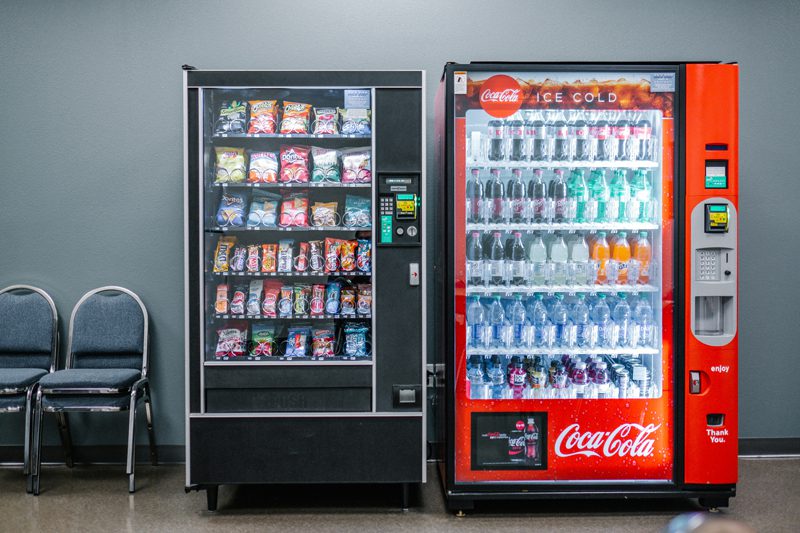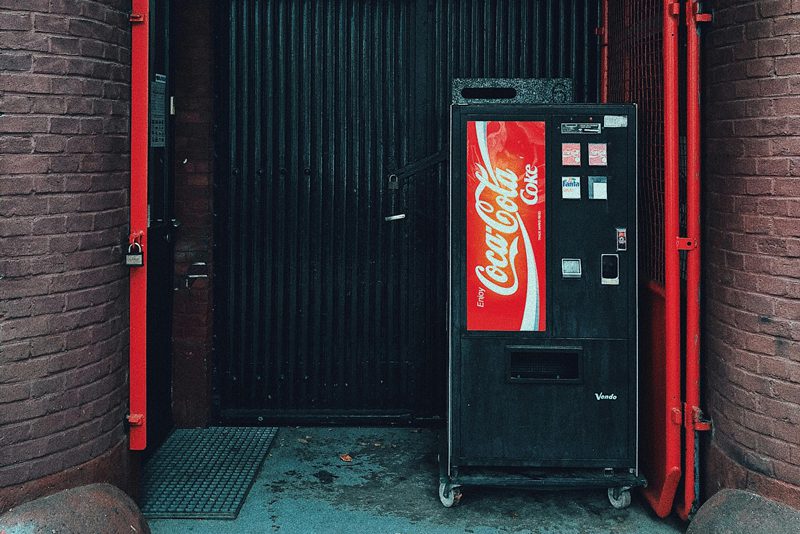In your everyday life, you’ve probably walked past hundreds of vending machines on your way to go to work, run errands, travel, or shop. And, those machines get a lot of action: Each day, 100 million people stop to use a vending machine somewhere in the U.S., with the average machine seeing somewhere around 14 customers per day. Have you ever considered it may be worthwhile to learn how to start a vending machine business?
While the humble vending machine might seem to blend into our surroundings, aspiring entrepreneurs might be interested to know that starting a vending machine business can be a simple—and lucrative—venture to explore.
If you’re curious about what it takes to start a vending machine business, we’ll dive into the pros, cons, and steps you need to take below. Let’s get started.
Why Start a Vending Machine Business?
The vending machine industry has a lot working in its favor. In fact, starting a vending machine business has a success rate of over 80%, letting you recoup your initial investment in around 12 to 18 months. Profit margins on vending goods are also high, averaging around 20% to 25% for most products. For fresh food items, those margins can be as high as 45%.
What’s more, vending machines are “open” 24/7, require minimal day-to-day upkeep, and can be placed in a wide variety of locations—from office buildings to bus stops to the mall. And, best of all, once they’re up and running, they can generate passive income while you sleep.
Pros of Starting a Vending Machine Business
Starting a vending machine business has many benefits that make it a great option for entrepreneurs of any level. Here are some key upsides to consider:
- Low startup costs: Compared to other kinds of businesses, starting a vending machine business requires relatively low startup costs and overhead costs. The average price tag on a vending machine typically runs between $3,000 and $5,000. Additionally, you’ll likely need to come up with a few hundred dollars to pay for permits and licenses, insurance, rent, and restocks. While not cheap, this can be far less expensive than starting another venture that requires costly equipment, retail or warehouse space, and heavy maintenance.
- No experience required: Experience-wise, starting a vending machine business has a low barrier to entry. You don’t need any prior experience in the vending machine industry. With the right research and planning, anyone can get started with this business.
- Flexible: If flexibility is important to you, a vending machine business fits the bill. You have the freedom to set your own schedule, choose locations that are convenient for you, and manage the business according to your preferences.
- Diverse products available: Vending machines are for more than just bottled water. These days, there are vending machines for all kinds of fresh and packaged food, beverages, personal care items, and even electronics. You can have different machines to dispense a wide variety of products, catering to different customer needs.
Cons of Starting a Vending Machine Business
Starting any kind of business will inevitably come with some drawbacks. When it comes to running a vending machine business, you should consider the following before diving in:
- Maintenance and vandalism: Vending machines do not require a ton of upkeep, but they do need regular maintenance to make sure they’re working properly and stocked with products. Additionally, vandalism can be an issue, which could lead to the need for repairs and loss of income.
- Variable income: The income from a vending machine business can be unpredictable. Factors like foot traffic, consumer spending habits, and location can all impact the amount of sales you make.
- Location dependency: The success of your vending machine business can be heavily dependent on the chosen location. If the foot traffic is low or the target demographic is just not present, it can significantly impact the profitability of the business.
- Inventory management: Managing inventory for vending machines can be tricky. It’s important to properly track and restock products to make sure you aren’t missing out on sales—but you’ll also want to avoid overstocking, which can lead to spoilage and waste.

How to Start a Vending Machine Business in 6 Steps
- Choose Your Business Structure
- Choose a Location
- Obtain Necessary Licenses and Permits
- Pick Your Vending Machine
- Stock Your Inventory
- Do Routine Restocks and Repairs
1. Choose Your Business Structure
When starting a vending machine business, it’s important to do things by the book, and that starts with choosing a business structure. A common choice for this industry is forming a limited liability company (LLC). An LLC provides personal liability protection for the owner (you) while allowing for flexibility in management and tax options.
Some business owners may be interested in moving forward as a sole proprietorship, which is the simplest and most common structure for small businesses in general. However, sole proprietorship does not provide you with personal liability protection. It may not be the best choice for a business that involves potential risk, such as owning and operating vending machines in public spaces.
Ultimately, the best business structure for your vending machine business will depend on various factors including the level of personal liability protection you desire, tax implications, management requirements, and the potential scalability of the business. It’s important to consult with a legal or financial professional to determine the most suitable option for your specific needs and circumstances.
2. Choose a Location
Choosing the right location is perhaps the most important factor in starting a successful vending machine business. Look for highly populated areas with plenty of foot traffic, like malls, airports, office buildings, hospitals, and schools. These locations offer a steady stream of potential customers and the opportunity for higher sales volume.
Before you pick a location, you should also consider the target demographic and what products would be most in demand there. For example, a vending machine in an office building might do well with chips and soda, while a machine in a gym might be better suited for protein bars and healthy snacks.
Additionally, look for areas with little to no competition. Placing a vending machine next to several others selling similar products can limit sales potential. Instead, aim for locations where your vending machine can stand out and attract customers looking for something different.
Once you’ve decided on a location, it’s important to get permission from the property owner, business owner, or local government (if it’s a public space) before actually installing a vending machine. Some locations may require a fee or a percentage of sales, so be sure to factor these costs into your plans.
3. Obtain Necessary Licenses and Permits
Before diving into the vending machine business, you’ll have to secure the necessary licenses and permits to operate legally. Depending on your local and state ordinances, and the type of products you plan to sell, you may need to get a business license, a seller’s permit, and possibly even a vending machine license.
A business license is a standard requirement for operating any type of business and can typically be obtained through your local city or county government. A seller’s permit, also known as a sales tax permit, is required if you plan to sell taxable goods like snacks and beverages. This permit allows you to collect and remit sales tax to the appropriate government agency.
In addition, some areas may require a specific vending machine license, which regulates the placement and operation of vending machines. These licenses are typically obtained through the local health department or a relevant regulatory agency.
It’s crucial to research the specific requirements in your area and to ensure that you have all the necessary licenses and permits before setting up your vending machines. Failing to obtain the proper documentation could result in fines or even the closure of your business.
4. Pick Your Vending Machine
It’s important to pick the right vending machine for your target market. There are many different kinds of vending machines that offer a wide variety of products, ranging from food and drinks to electronics and beauty products. Step one is deciding which type of vending machine (or machines) you want to purchase.
Remember to consider the demand, location, and target audience where you plan to set up your machine. For instance, a vending machine offering healthy snack options might be more successful in a gym or fitness center, while a vending machine offering electronic gadgets and phone accessories could be more successful in a mall or airport.
Popular Types of Vending Machines
- Food and beverage vending machines: Snack and beverage machines are some of the most common types of vending machines you’ll find in public spaces. They typically offer a variety of chips, pretzels, candies, crackers, and other snacks as well as a selection of cold drinks like soda, juice, and water. To elevate this, you could look for a fresh food vending machine that sells cold sandwiches, salads, and other more substantial fare.
- Coffee vending machines: Coffee vending machines are specifically designed to offer a quick and convenient way to get a hot cup of coffee on the go. These machines often have a selection of different coffee options, such as regular coffee, cappuccinos, lattes, and even hot chocolate.
- Bulk vending machines: Bulk vending machines include the classic hand-crank machines you see in restaurant or grocery store vestibules. They typically sell things like gumballs, stickers, or small toys. Because of their limited offerings and mechanical, manual nature (ie; customer inserts a coin and turns a knob), these machines tend to have low overall costs.
- Personal care vending machines: These vending machines provide a convenient way to purchase toiletries or personal care items on the go. You might find products like makeup, toothpaste, soap, deodorant, sunscreen, or even over-the-counter medication in these types of vending machines. They’re commonly found in airports, train or bus stations, and rest stops.
- Electronics vending machines: You’ve likely seen these vending machines at the airport, in the mall, or at another very high-traffic location. They often offer a selection of electronic gadgets and accessories like headphones, chargers, phone cases, and portable speakers.
5. Stock Your Inventory
When starting a vending machine business, planning and stocking inventory should be done carefully. You should first conduct some market research to identify the preferences and demands of your potential customers.
Once you have a good understanding of your target market, carefully select a variety of products to stock in your machines. If you’re going to be vending food, choose popular items with a long shelf life that are easy to restock and maintain. Consider offering a mix of healthy and not-so-healthy snacks and beverages to cater to different preferences.
It’s important to routinely monitor your inventory, track sales, and gather feedback from customers to make informed decisions about which products to stock. Some estimates note that fully stocking a small vending machine can range from $200 to $300, while larger machines can run closer to $500. As the business develops, tracking inventory is vital not only to pick winning products but also to avoid wasting money on unpopular items that expire before anyone buys them.
6. Do Routine Restocks and Repairs
Regular restocking and maintenance will keep your vending machines running smoothly. This means visiting your machines frequently, refilling them, and keeping track of what items are flying off the shelves—as well as what items are lingering and might need to be swapped with something else. The cost of a restock can vary quite a bit depending on what items you sell and how much of your inventory needs replacing. You likely will not have to replace 100% of your inventory at a time apart from the initial fill-up.
In addition to restocking, it’s also important to maintain your vending machines to make sure they continue to operate properly. Vending machines don’t require a lot of upkeep, but you’ll need to routinely clean the machines, check for any mechanical issues, and make any necessary repairs to keep them in good working condition.

How to Start a Vending Machine Business: FAQs
Are vending machines profitable?
Vending machines can be profitable, but those profits can vary. Some industry outlets report that a single vending machine can bring in over $300 per month. Profit margins can range from 20-45% on each item sold, giving you the potential to earn several thousand dollars per year.
Location and product selection will be the biggest deciding factors in the success (and profitability) of your vending machine business. While you may not make $100 a day, selecting high-demand products, like cold drinks or healthy snacks, and finding high-traffic locations can significantly increase the number of sales you make.
How do you buy a vending machine?
Starting a vending machine business begins with purchasing the vending machines themselves. First, research the types of vending machines available and determine which ones best suit your business goals. Then, consider whether you want to buy a new or used vending machine from a reputable supplier. Used machines will be less expensive, but make sure to thoroughly inspect them for any defects or issues before buying.
Once you’ve picked out the vending machines you want, negotiate the terms of the sale and finalize the purchase. Consider the cost, warranty, and any additional services included in the purchase. Finally, factor in the delivery and installation of the vending machines to your desired location.
How much is a vending machine?
On average, a new vending machine costs between $3,000 and $5,000. However, the price can vary depending on the type of machine, size, and features. For example, a small refurbished snack vending machine may cost less than $1,500, while a larger combo vending machine that sells fresh food and cold drinks could cost well over $5,000. Large newer machines with credit card readers and smart technology can cost even more.
It’s also important to consider the cost of stocking the machine, maintaining it, and any potential location fees.
What are the most popular vending machine items?
Some of the most popular vending machine snacks include chips, pretzels, candy, gum, energy bars, crackers, and fresh sandwiches. For beverages, carbonated sodas, juice, water, and sports drinks tend to be top sellers.
Outside of the classic snack-and-drink machines, popular non-food vending machines offer beauty products, over-the-counter medicines, electronics, jewelry, and even clothing.
Where can you put a vending machine?
Many types of locations can be good for placing a vending machine. High-traffic areas like malls, airports, train stations, bus stations, and office buildings are ideal. These locations have a constant flow of people (more than 50 per day passing through) who might be on the lookout for convenient snacks and drinks.
Schools and universities are also great places to put vending machines, as students often look for a quick bite in between classes. Additionally, placing vending machines in hospitals, gyms, and recreational centers can be smart, as people often look for refreshments after exercising or visiting a loved one.
Other good locations for vending machines include hotels, gas stations, car dealerships, laundromats, apartment complexes, and even public parks or beaches. Regardless of where you decide, you’ll need to obtain permission from either the business owner or the local government before placing a vending machine in that location.

